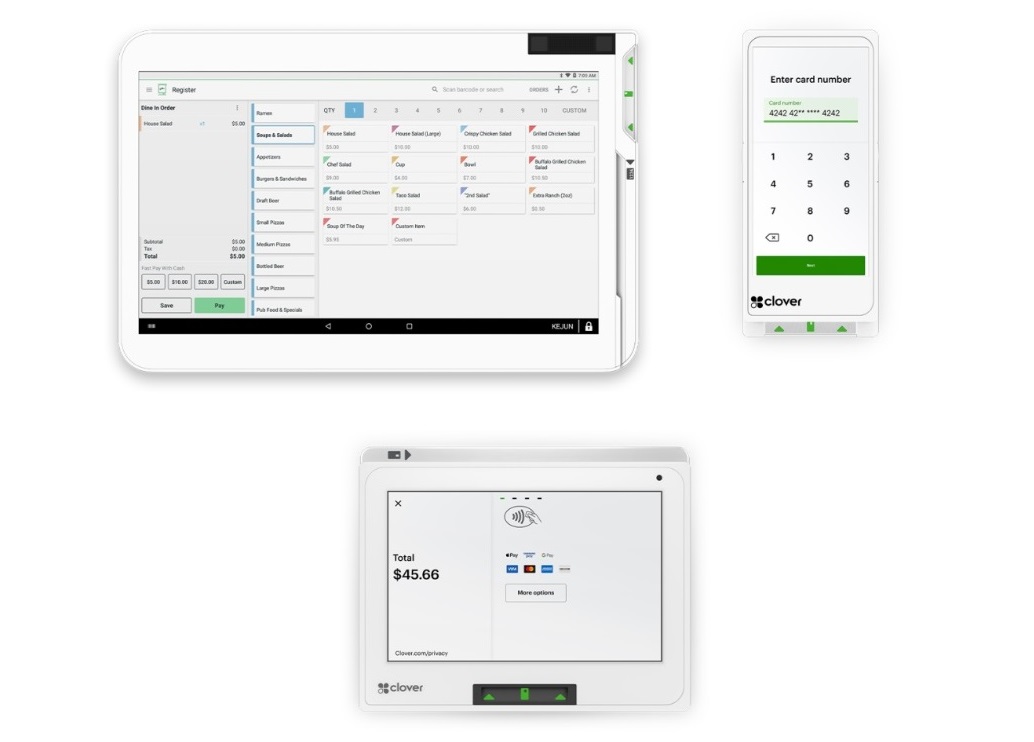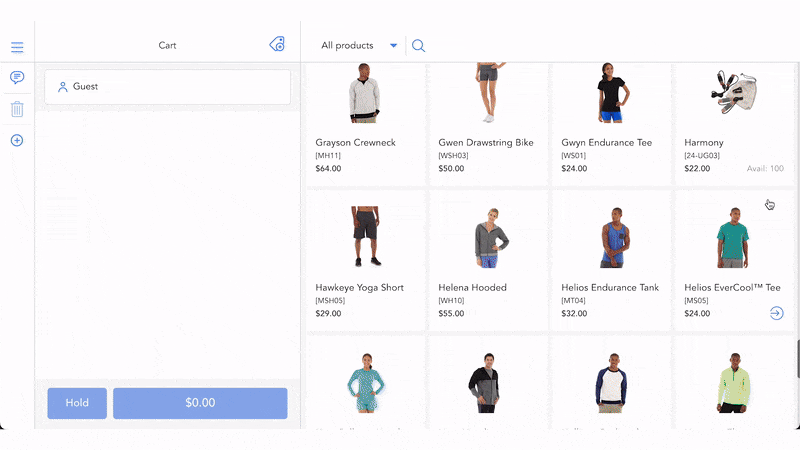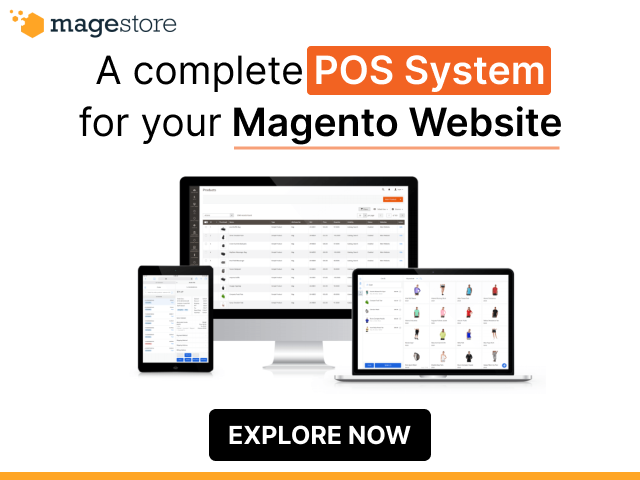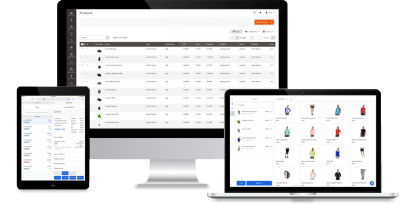Clover POS Magento integration facilitates data transfer between the Magento platform and the Clover POS system, thus allowing business owners to manage their online and offline stores efficiently. Connecting Magento with Clover point of sale eases inventory management, payment processing, and customer data collection for better insights, thus bringing customers an ultimate omnichannel shopping experience.
To benefit from this integration, retailers normally have to use a connector since Clover POS is not natively compatible with Magento. However, using a 3rd-party integration solution yields unexpected outcomes that may affect overall business efficiency. By resorting to an external solution for managing your business, you run the risk of data loss or mismatch when the connector works improperly, lose full control of your systems when problems arise, and have to pay higher costs for the standalone Clover POS and a 3rd-party connector.
In this post, we give you the list of the top Magento Clover POS connectors. Besides, we also analyze the drawbacks of using these connectors and recommend a more optimal solution for effective data syncs. Keep reading on!
Benefits of Clover POS Magento integration
Linking Magento with Clover POS enables seamless data flows between the two systems, thus letting merchants effectively monitor different aspects of their business, such as inventory, products, and orders. On that basis, retailers can take proper actions to boost sales and deliver their customers an uninterrupted shopping experience.
- Manage inventory in real time: Connecting Clover POS with Magento allows you to track inventory levels for eCommerce and physical stores to replenish the right products, thus avoiding stockouts or overselling. The integration also keeps product information, such as description, attributes, and prices consistent across sales channels.
- Provide useful customer insights: Magento 2 Clover POS integration consolidates critical customer information across channels, such as purchase histories, preferences, and spending habits. With this data, you can gain a unified view of your customers through different touchpoints during their buying journey to create tailored marketing messages and offers to generate more sales.
- Deliver omnichannel experience: Linking Clover POS with Magento transfers inventory, orders, and customer data between online and offline stores, thus allowing you to choose the physical locations to fulfill online orders faster. Besides, you can also better satisfy your customers by giving them many omnichannel order fulfillment options, such as in-store pickup and delivery.
- Minimize data errors: The automatic data exchanges between the two systems eliminate the need for manual data entry, thereby reducing errors and saving time and effort for more important tasks.
5 best connectors to integrate Clover POS and Magento
Below is the list of the best connectors you can use for Magento 2 Clover integration.
Connector | Key features | Pricing | Pros | Cons | Customer reviews |
Commercium by Constacloud |
| The detailed pricing depends on your total order and product listing quantity. There are 3 plans as follows.
|
|
|
|
Open Flux by My Solution Connect |
| Contact for details |
|
|
|
Should I use extensions or iPaaS?
Whether to use extensions or iPaaS depends on your business situation. In particular, you can:
- Choose an extension if you need an easy-to-use, fast, and cost-saving integration solution to sync data between Clover POS and Magento. As employing extensions doesn’t require much coding knowledge, this is the best choice for businesses with limited technical capacity.
- Choose an iPaaS if you need a more powerful and feature-rich integration solution. Besides moving data between Clover POS and Magento, iPaaS also helps merchants automate workflows and connect with extra apps and software to expand functionality. With these capabilities, iPaaS is often more expensive and complicated to use than extensions.
3 criteria to choose the best connector
Consider the key criteria below to pick the most suitable Magento 2 Clover POS connector for your business.
- Business requirements: You should assess your current business situation and needs before deciding which connector to use. Your chosen solution should have the necessary features to sync your key business data in expected quantities and achieve your business goals. Additionally, you’d better consider whether you need a connector that can scale with your business in the future.
- Technical capability: Evaluate your technical capacity to choose the most suitable integration solution as some connectors are more complex than others. These connectors often require technical expertise to use and tailor to specific needs while others are simpler and demand no or little coding knowledge.
- Company budgets: Clover POS Magento connectors constitute a considerable expense for your business. To make sure these costs don’t eat into your profits, research the pricing structure of each connector provider and choose the most reasonable one. Remember to calculate Clover POS and the connector to see whether the total costs exceed your financial capacity.
5 tips for a smooth Clover POS and Magento integration
- Set business objectives: A clear business objective before Clover POS Adobe Commerce integration clarifies what you want to get with the integration and how it contributes to your business success. With well-defined targets, you can precisely assess the integration’s performance and make necessary changes to achieve your goals.
- Define data mapping and workflows:
Deciding the data types you wish to sync beforehand helps you avoid overloading your system with unnecessary data, which might accelerate data movement between the two systems and ensure system stability.
You should also determine the sync frequencies (real-time, near real-time, once every hour) and directions (one-way or two-way).
With detailed planning, you can monitor the data transfer and tackle any problems promptly. - Clean data: By cleaning data, you can rest assured all data points that you want to sync between Clover POS and Magento are accurate, relevant, and consistent, thus providing you with complete and useful information for running your business. The cleaning jobs also minimize the duplicated data that might affect the accuracy of business insights.
- Choose a suitable integration connector: You should select a Magento Clover integration solution that has all the features needed to meet your integration requirements and stay within your budget. Besides functionality, check whether the connector is customizable, flexible, and scalable for your future growth. You should also choose a connector whose provider can offer dedicated and timely support to handle unexpected issues.
- Supervise and maintain: It’s necessary to allocate sufficient resources to track and maintain the Clover POS Adobe integration. Close supervision allows you to detect and quickly handle errors and reveal the opportunities or areas that need improvement.
Enjoy direct connection with a Magento-native POS, no connector needed:
If your goal is to find a point of sale to bridge your Magento and physical stores, why not a Magento-native POS?
Drawbacks of Clover POS Magento integration connectors
Although the connectors are useful for Clover POS Magento integration, they have several crucial downsides that you should take into consideration.
- Unstable connections: Using middleware to join Clover POS and Magento means establishing an indirect connection between the two systems for data transfer. This connection isn’t always stable as the connector can have errors and malfunction at any time during the process, leading to sync interruptions, data mismatch, or data inaccuracy.
- High expenses: Besides the high monthly fees for Clover POS, you need to pay a substantial amount for a 3rd-party connector, which often charges subscription-based prices. The total costs for a complete Clover point of sale that can work with Magento can be extremely high, especially when your order and product quantities keep increasing, resulting in severe impacts on your profits in the long term.
- Multiple contact points: Involving a 3rd-party in running your business reduces your autonomy over your systems and the Clover POS Magento integration. In most cases, you must contact the POS and connector providers to control, maintain, detect, and handle any problems, which entails lots of time and effort.
- Security concerns: Employing an external connector means sharing your data with another party, which makes your business more vulnerable to security threats, such as unauthorized access or data breaches.
Magestore Magento POS to directly link with Magento
Clover Magento 2 integration using external connectors has unignorable drawbacks. Therefore, utilizing a Magento-native POS to ensure a stable connection with Magento for seamless data exchanges and lower the total business costs is optimal. Magestore Magento POS is a native, robust, and affordable POS that can help you sync key business data between your online and physical stores. Magestore POS for Clover even integrates with Clover Payments, allowing you to retain your payment processor while benefiting from a Magento-native POS for smooth and accurate data syncing.
Let’s compare Magestore POS and Clover POS to see why a native POS for Adobe Commerce excels.
Magestore Magento POS | Clover POS |
Direct integration:
| Indirect integration:
|
More advanced features for expansion:
| Limited advanced functionality:
|
Affordable and flexible pricing:
| High recurring price:
|
Read more:
- What is Magento POS? Differentiating native and non-native solutions
- Magento eBay integration: 7 connectors for seamless linking in 2024
- Magento HubSpot integration: 6 best connectors for 2024
Conclusion
Clover POS Magento integration syncs key data, such as inventory, products, customers, and orders between online and physical stores, thereby simplifying business operations, improving efficiency, and enhancing customer experiences. The most common way to connect these two systems is to use a 3rd-party connector, such as SKU IQ, eCync, or Commercium since Clover POS is not natively compatible with Magento. These integration solutions, though helpful, produce many negative outcomes.
Retailers who wish to avoid the disadvantages of using an external connector should consider using a Magento-native POS for more stable integration. Magestore POS is a powerful and feature-rich Magento 2 POS that can connect directly with Magento for data syncs. The POS is also customizable and scalable to meet the ever-changing demands of your business.
Choosing a 3rd-party connector to link a standalone POS with Magento or employ a native Adobe POS is up to you as long as your go-to method serves your purposes. Make sure to research carefully to see which one is the best fit for your business!
FAQs
What is the monthly cost for Clover POS?
The monthly fees for Clover POS depend on your business type. Clover POS has different pricing plans for full-service dining, quick-service restaurants, retail shops, professional or personal services, and home and field services.
For example, there are 3 pricing plans for Clover Retail POS as follows.
- Starter plan: $13/ month for 36 months or $279
- Standard plan: $135/ month for 36 months or $1,799 + $49.95/ month
- Advanced plan: $190/ month for 36 months or $2,398 + $69.90/ month
Is Clover a good POS system?
It depends. Clover POS has basic features that make it most suitable for small businesses. However, mid-sized or large merchants will find Clover POS lacking as it doesn’t have many advanced features to cater to their needs.
Does Clover POS require a contract?
Yes, you need to enter into a contract with Clover to use its services, normally from 12-36 months.
What is Clover POS best for?
Clover POS is best for small retailers or service providers who need basic features to manage their businesses and use Clover payment processing services to handle transactions.














